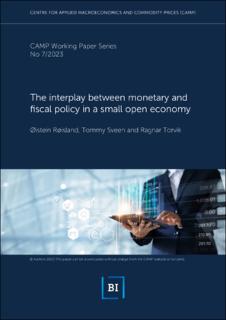The interplay between monetary and fiscal policy in a small open economy
Working paper
Permanent lenke
https://hdl.handle.net/11250/3086068Utgivelsesdato
2023-08Metadata
Vis full innførselSamlinger
Sammendrag
We develop a theory for the optimal interaction between monetary and fiscal policy. While one might initially think that monetary and fiscal policy should pull in the same direction, we show within a simple model that this is not always the case. If there are small costs of changing the interest rate, it is optimal that monetary policy and fiscal policy pull in opposite directions when the economy is hit by an inflation or exchange rate shock. The reason is that monetary policy affects inflation through both the demand channel and the exchange rate channel, while fiscal policy only affects inflation through the demand channel. Therefore, monetary policy has a comparative advantage in stabilizing inflation, while fiscal policy has a comparative advantage in stabilizing output. Only when the costs of changing the interest rate are sufficiently high will it be optimal for monetary and fiscal policy to pull in the same direction. We also analyse how tax deduction for interest payments affects the monetary policy transmission. Such an interest subsidy improves goal achievement in response to inflation and exchange rate shocks, but the opposite is true in response to demand shocks.
